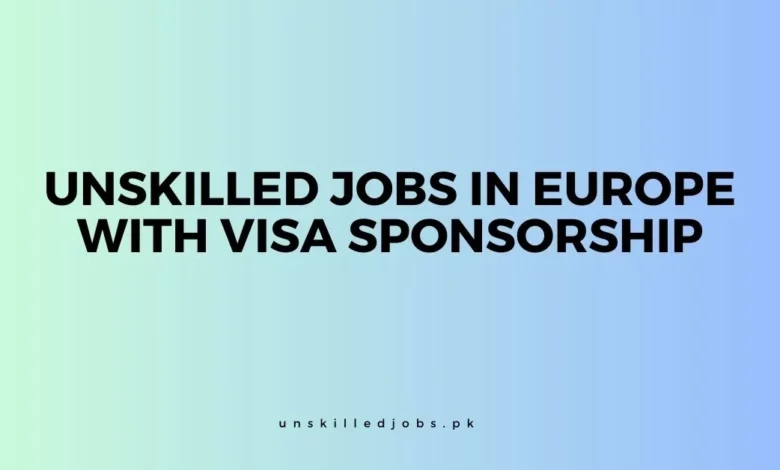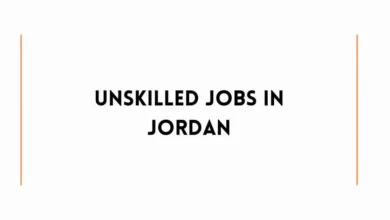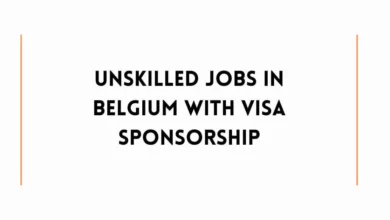Unskilled Jobs In Europe With Visa Sponsorship 2024

You can find good, untrained jobs in Europe that will pay for your visa if you have some basic knowledge, work hard, and learn new skills. Job opportunities that pay for your travel visa are one of the best and cheapest ways to see some of Europe. Also, no, you don’t have to be an expert in a certain area to get to this.
This guide tells you everything you need to know about low-skilled jobs in Europe that will sponsor your visa. You will learn what you need to do to get your first job in any European country by the end of this piece.
You will also have a better idea of the basic skills that are needed in the different types of businesses that have jobs for people without skills.
With the information in this piece, you should be able to get ready to apply for a resident permit as soon as possible. First, though, what are some low-skilled jobs in Europe?
Introduction
Because of how quickly jobs are changing in Europe, unskilled jobs have become very important in many fields. This piece goes into detail about low-skilled jobs in Europe, with a focus on visa sponsorship. It shows people looking for work in Europe what options they have.
The Growing Demand for Unskilled Labor
Rising economic growth, changing demographics, and changing market needs are some of the things that are making Europe need more poor workers. Companies are realizing how important this group of workers is, which is creating more job possibilities.
Visa Sponsorship: A Game-Changer
Visa funding can be very helpful for people who want to work in Europe but don’t have a lot of experience. It not only makes legal work easier, but it also gives people access to many chances that they wouldn’t have had otherwise. Visa sponsorship makes it possible for people to help the economies of Europe while also pursuing their job goals.
What are Unskilled Jobs in Europe?
And just like the word says, unskilled jobs are ones that don’t require a degree or any special skills. Most of the time, these jobs are for service roles and require a lot of physical labor.
These are some common examples of low-skilled jobs in Europe:
- Cleaners
- Construction workers
- Factory workers
- Farm workers
- Agricultural workers
- Care workers
- Cleaners
- Construction workers
- Factory workers
- Food service workers
- Hotel workers
- Laborers
- Retail workers
- Security guards
- Taxi drivers
- Warehouse workers etc
Some of these jobs aren’t very well paid compared to those of skilled workers, and there aren’t many chances to learn new skills or move up.
To be fair, though, they are a good way to start a job in Europe and give you the freedom to see more of the continent. You can also get certified in other areas, which gives you room to grow as a person since these jobs are very open.
In Europe, on the other hand, newcomers and refugees do most of the unskilled work. Unless it’s a student who gets one of these jobs as a side job while doing their schoolwork,
Additionally, unskilled jobs don’t require a lot of skills. To do well in any of these roles, you need to be flexible and ready to learn new ones in order to keep your job.
Benefits of Unskilled Jobs in Europe
- Procurement of Employment Opportunities: Unskilled labor frequently serves as a readily available means of entering the labor market, presenting prospects for individuals who possess limited formal education or specialized training.
- Income Immediate: Unskilled labor generally offers an immediate means of earning a livelihood, enabling people to fulfill their fundamental financial obligations and sustain their families.
- Availability of Jobs: Those in search of immediate employment may find unskilled labor positions more readily accessible, particularly in sectors including agriculture, retail, hospitality, and manufacturing.
- Adaptability: flexibility
- Flexible work hours may be provided by some unskilled occupations, enabling workers to manage their professional obligations alongside other commitments or pursue further education or training.
- Educational Opportunities: For individuals entering the workforce, unskilled labor can function as a valuable educational experience, exposing them to fundamental aspects of work, workplace dynamics, and customer service.
- Social Advantages: Gaining employment, irrespective of the level of expertise required, can positively impact an employee’s self-esteem, sense of direction, and social integration in the community.
- Engaging in networking: Opportunities to develop professional networks, which can be advantageous for career advancement and future employment prospects, may be available through unskilled labor.
- Perks and Discounts for Employees: An additional advantage that certain employers provide is employee benefits, including discounts on products or services. This can particularly benefit those who are employed in menial positions.
- Stability; Although menial labor may be regarded as less specialized, it is still possible to find stable employment through them, particularly in sectors where labor is consistently in demand.
- Potential for Progression: Certain menial positions may present prospects for professional growth and development within the organization. Dedicated and diligent staff members may eventually be considered for promotions or additional responsibilities.
- Workplace Safeguards: Certain safeguards, including but not limited to legal rights, safety regulations, and minimum wage requirements, are generally bestowed upon unskilled laborers, thereby guaranteeing equitable treatment within the professional environment.
- Promoting an Inclusive Workforce: Unskilled labor frequently fosters an inclusive and diverse workforce by uniting individuals with varying life experiences and backgrounds.
Visa Sponsored Unskilled Jobs in Europe?
If you want to work in Europe but don’t have any skills, you can get a visa support job. This means that your company in Europe is in charge of helping you get a visa. They handle your paperwork and send it to the European government for approval, which is a lot of work.
So, if you are qualified for a job that will support your visa, you will be able to easily enter Europe because your home country will be told about your appointment from Europe. Also, jobs that support visas come with free work and a residence permit, so you won’t have to pay anything to get your papers when you get to Europe.
But there are some simple things you need to do in order to be able to get a job in Europe that will pay for your visa. In the next part, we’ll talk about that.
How to get a Job in Europe with Sponsorship?
If you want a job that will sponsor your visa, you have to meet the standards listed for the job. You must meet these conditions in order to be qualified for an unskilled job in Europe that will pay for your visa.
- have an offer from a company in Europe.
- Take along enough cash to get you through your time in Europe, at least until you get paid again.
- Meet the basic requirements to work in the place where you want to work. Do study by country to be sure you know what is needed and what isn’t.
- Age: You need to be at least 18 years old.
- Get a copy of your clean criminal record signed by the officials in the country where you live.
Please make sure you check the official government website for the European country you want to work in before you send in your application.
How to Apply for Unskilled Jobs in Germany
You can look for or apply for low-skilled jobs in Europe in a number of different ways. You can either use official job search sites or hire someone in Europe to do the search for you. Another option is to use a recruitment firm. If you’re looking for low-skilled work in Europe, it’s best to use a job search tool or recruitment agency that you can trust.
Here are some of the best job search sites in Europe that can help you get a visa for unskilled work.
- Indeed
- Jobrapido
- EURES
- EuropJobs
- Fasthire
- Monster
- Work In Berlin
- Stepstone
You can also use reliable job agencies in Europe to find and apply for low-skilled jobs that match your qualifications, as we already said.
These are some of the best job boards in Europe where you can work:
- Approach People Recruitment
- European Recruitment
- Tiger Recruitment
- EMEA Recruitment
- Euro London Appointments
- Hays
- Michael Page
- Kelly Services
- Randstad
- Adecco
- Antal International
- ManpowerGroup
Read Also: Unskilled Jobs in Melbourne with Visa Sponsorship
Top Unskilled Jobs in Europe with Visa Sponsorship for Foreigners
Here are the most popular low-skilled jobs in Europe that can help you get a visa.
- Cleaners
- Construction workers
- Farm workers
- Agricultural workers
- Care workers
- Construction workers
- Factory workers
- Food service workers
- Hotel workers
- Caregivers
- Laborers
- Retail workers
- Security guards
- Taxi drivers
- Warehouse workers
Cleaner
Cleaning staff are needed in almost all of Europe’s institutions and groups. Asia and Africa are lucky to have a lot of businesses that need industrial and commercial workers. You can do more than one cleaning job or other job as a cleaner because you will work shifts based on the company you choose.
Hotel Jobs
In Europe, there are a lot of hotels that want to hire foreign workers and will support their visas for free. In European Hotels, on the other hand, you need to have some basic skills, which is different from other low-skilled jobs that don’t require specific skills. Being able to speak and act in a social situation in the most efficient way is one of these skills.
Nanny Jobs
Because there are more working-class moms, almost every home in Europe needs a nanny. Many of these moms work from 9 to 5, so it’s hard for them to take care of their young children. Instead, they hire Nannies.
There are also some extra perks that come with being a nanny. First, as a nanny, your boss may be able to help you find a place to stay. Even better, if you play your cards right, you can become part of a European family. Also, it’s very easy to find and get a nanny in Europe because they are paid well.
Security Jobs
The number of unskilled workers employed in Europe as a whole showed that security jobs are the most popular. No one, not just homeowners, not just businesses, not just towns, needs trained security staff to keep their homes and lives safe.
But in order to do this job well, you need to have some kind of security license. Besides that, you need to go through special training to be able to do the job.
Caregivers
As more and more people in Europe get older, there is a greater need for personal aides. You will be taking care of people who can’t take care of themselves as a nurse. For instance, an old person who is sick but can still do simple things. Along with that, nannies work in both private homes and businesses.
Conclusion
To sum up, low-skilled jobs in Europe that can sponsor a visa can open up new job chances for people who are looking for work. As the need for low-skilled workers grows, it becomes more important than ever to understand how this job market works.
Frequently Asked Questions:
-
How can I find unskilled jobs with visa sponsorship in Europe?
Check out job boards, company websites, and government programs in European countries that are available online. The piece gives detailed advice and links for job searching that works.
-
What challenges do unskilled workers commonly face in European countries?
Language barriers, cultural differences, and a lack of tools are some of the problems that unskilled workers often face. This piece talks about these common problems and gives useful tips on how to fix them.
-
Which countries pay the highest for unskilled workers?
Luxembourg. Luxembourg offers the highest minimum wage of any country worldwide at US$3,169 (EUR 2,936) per month for skilled talent over the age of 18. Unskilled talent, or talent under the age of 18, receives a lower monthly minimum wage. Unskilled workers 18 years of age and older: US$2,641 (EUR 2,447)


